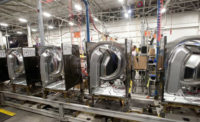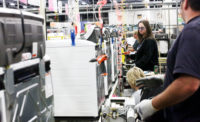LOUISVILLE, KY—GE Appliances, a Haier company, has graduated the first engineer from its new Industry 4.0 Development Program, which targets recent engineering college graduates or midcareer employees who want to work at the company’s nine smart factories in the U.S.
As digital transformation sweeps across GE Appliances, the company’s supply chain team has been focused on developing talent to master new technologies and deliver results from the $1 billion in capital investments the company has made over the past five years. The two-year Industry 4.0 training program has four highly technical rotations in industrial controls, robotics, testing and data visualization.
“To help us bring in and sustain much more advanced, automated equipment, we need people who understand it and who can ensure it’s designed correctly to fit into our digital environment,” says Trent Ingrim, senior director for advanced manufacturing and Industry 4.0 at GE Appliances. “A lot of younger people want to grow their careers quickly. When they realize they can gain a lot of experience and seven or eight advanced certifications in just two years, they get excited.”
The company plans to triple the number of engineers in the program over the next couple of years.
Collie Crawford has the distinction of being the company’s first graduate of the new program. With most of his co-op and prior work experience in industrial controls, Crawford was intrigued by the job posting and learning more in the other three areas.
“I loved learning from the engineers during my rotations and finding new applications and ways to do things,” says Crawford. “There are so many considerations on how to make things work that you can’t learn in a class.”
The program is ideal for people with degrees in computer science engineering and mechanical engineering or graduates of mechatronic programs. The format of the program helps engineers see how systems work together and elevates their problem-solving skills.
The four rotations—industrial controls, robotics, test and Brilliant Factory—provide the skillsets for today’s modern supply chain engineering roles.
Industrial controls. The machinery in today’s modern plants is complex, with industrial and electrical controls that need to be programmed, including HMIs and PLCs. In addition, there are many safety controls, such as light curtains and area scanners. During this rotation, students participate in OEM design reviews and run-offs to learn how to ensure the equipment is compatible with the appliance manufacturer’s digital plant environment.
Robotics. Participants learn to incorporate the use of robots and other technologies, such as machine vision.
Test. Years ago, GE Appliances management decided it would be a strategic advantage to create software and programming in house for test systems and equipment. That strategy boosted first pass yields by as much as 10 percent. The improved data is being reported or fed into the company’s Brilliant Factory data visualization system. To finish out the rotation, participants develop competencies in high-level programming and database use.
Brilliant Factory. Participants continue to develop and refine the company’s factory data visualization tool, Brilliant Factory, bringing new features to the platform on a weekly basis.
“After completing the program, we want them to understand how a smart, interconnected factory works, and identify what they like most and feel the strongest about as they look for their first assignment off program,” says Ingrim.
Since graduating, Crawford has taken a controls engineering position in dishwasher manufacturing and hitting the ground running. He’s already been able to contribute with problem-solving on the new dishwasher wire rack line.
“The program has made me a better automation engineer, prepared to solve broad problems within the plant,” he says.



